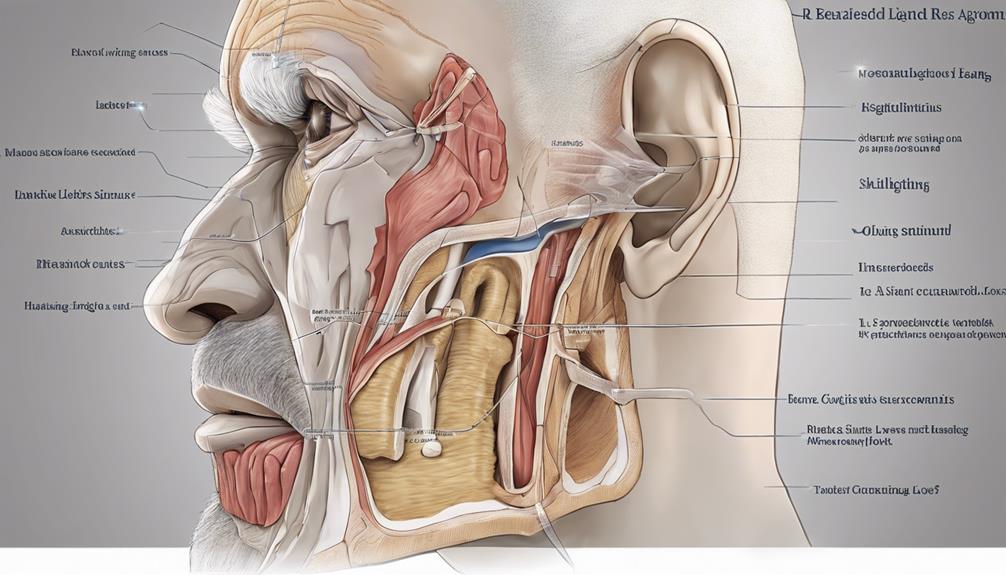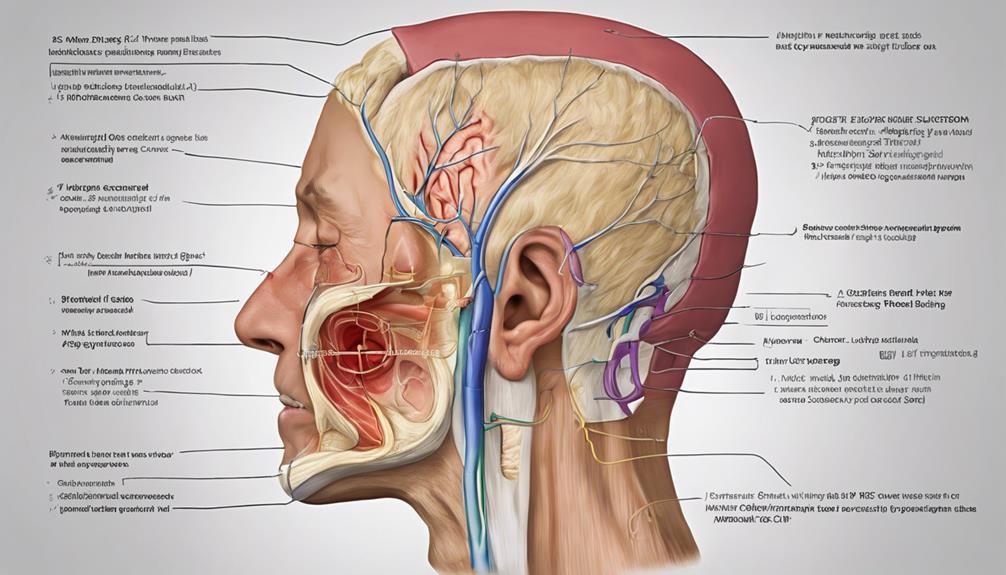Have you ever thought about the relationship between hearing loss and feelings of anxiety? The complexity of this connection might surprise you.
As we explore the intricate interplay between hearing impairment and anxiety, we uncover a web of challenges that extend beyond just the physical aspect of hearing loss.
Stay tuned to discover the profound impact this often-overlooked connection can have on one's mental well-being and the strategies that can help navigate this terrain effectively.
Key Takeaways
- Hearing loss increases anxiety risk significantly, especially in older adults.
- The relationship between hearing health and mental health is substantial.
- Prompt intervention and hearing aids can reduce anxiety linked to hearing loss.
- Tailored coping strategies and support help manage anxiety effectively.
Understanding the Link Between Hearing Loss and Anxiety
In understanding the link between hearing loss and anxiety, it becomes evident that these two conditions intricately intertwine, impacting individuals in profound ways. Adults with even mild hearing impairment face a 32% higher risk of reporting anxiety. For those with moderate to severe hearing loss, aged 76 to 85, the likelihood of experiencing anxiety jumps by 59%.
This correlation isn't merely coincidental but indicative of a significant relationship between hearing health and mental health. Studies have shown that individuals with hearing loss have a greater chance of developing anxiety symptoms over time. The effects aren't isolated; rather, they create a complex interplay where one's hearing condition can worsen due to anxiety, and anxiety can be heightened due to the challenges posed by hearing loss.
It's vital to recognize these connections to address both hearing loss and anxiety comprehensively, considering the impact they've on overall well-being and quality of life.
Impact of Hearing Loss on Mental Health

Chronic stress resulting from hearing loss can have a profound impact on an individual's mental health, potentially leading to long-term anxiety issues. Research shows that individuals with reduced hearing, especially older adults, face a higher risk of experiencing anxiety symptoms. The prevalence of anxiety disorders is notably elevated among those with moderate to severe hearing impairment. Social anxiety disorder can develop due to the challenges of communication and the feelings of social isolation that often accompany hearing loss.
To mitigate the negative effects of hearing loss on mental health, various coping mechanisms and strategies can be employed. Utilizing hearing aids and assistive listening devices can significantly improve communication and reduce feelings of social isolation, thereby alleviating anxiety symptoms. Additionally, implementing effective communication strategies within personal relationships and social interactions can enhance overall well-being. It's crucial for individuals with hearing loss to address their mental health proactively and seek support to manage any anxiety-related issues that may arise.
Managing Anxiety Associated With Hearing Loss
Understanding the impact of anxiety on individuals with significant hearing loss is crucial in developing effective strategies for managing this common challenge. Anxiety symptoms can be particularly challenging for those with compromised hearing, as social interactions and communication may already be complex.
Seeking professional help and considering hearing aids based on a hearing test can significantly reduce anxiety risks associated with hearing loss. Counseling can provide coping mechanisms and support tailored to the individual's needs. Prompt intervention is key in addressing anxiety related to hearing loss, as it can prevent further cognitive decline and enhance overall well-being.
Research shows that utilizing hearing aids not only improves communication but also reduces the risks of anxiety, depression, and cognitive decline in individuals experiencing hearing impairment. By taking proactive steps to manage anxiety in the context of significant hearing loss, individuals can navigate social situations more confidently and improve their quality of life.
Strategies for Coping With Hearing-Related Anxiety

Utilizing coping strategies tailored to individual needs is essential for effectively managing anxiety related to hearing loss. When it comes to coping with hearing-related anxiety, there are several strategies that can help reduce anxiety and improve overall well-being:
- Hearing Aid Use: Incorporating hearing aids can significantly reduce anxiety levels by improving communication and reducing feelings of isolation.
- Seeking Professional Help: Consulting audiologists or therapists specializing in hearing loss can provide tailored coping strategies and support.
- Relaxation Techniques: Engaging in practices like deep breathing, meditation, or yoga can help alleviate anxiety symptoms and promote relaxation.
- Support Groups: Joining support groups for individuals with hearing loss can offer a sense of community, emotional support, and understanding, which are crucial for managing anxiety.
Supporting Individuals With Hearing Loss-Induced Anxiety
Supporting individuals grappling with anxiety stemming from hearing loss involves creating a compassionate and inclusive environment that fosters effective communication and understanding. Providing emotional support and empathy can make a significant difference in how those with hearing loss-induced anxiety feel supported. Creating a communication environment that reduces background noise can help ease anxiety in these individuals. Being patient and empathetic during conversations is crucial for offering anxiety relief. Educating oneself about hearing loss and anxiety is essential to provide better support and understanding. Practicing active listening and speaking clearly can enhance communication and reduce anxiety in individuals with hearing loss.
| Support Strategies | How It Helps | Tips for Implementation |
|---|---|---|
| Emotional Support | Offers comfort and reassurance | Validate feelings, offer a listening ear |
| Communication Environment | Reduces stress and enhances understanding | Choose quiet settings, use visual cues |
| Active Listening | Improves communication and fosters trust | Maintain eye contact, show interest in the conversation |
| Education | Increases awareness and promotes empathy | Learn about hearing loss and anxiety, ask questions |
Frequently Asked Questions
How Does Hearing Loss Cause Anxiety?
Hearing loss can cause anxiety through various channels, such as communication challenges, social isolation, and cognitive strain. The frustration and feelings of being overwhelmed due to compensating for hearing loss can heighten anxiety.
Additionally, the presence of tinnitus, often linked to hearing impairment, can worsen anxiety symptoms. As hearing loss progresses, difficulties in daily activities can lead to increased anxiety levels.
These factors collectively contribute to the intricate relationship between hearing loss and anxiety.
Can Ear Problems Cause Anxiety?
Yes, ear problems can indeed cause anxiety. When our hearing is compromised, it can lead to difficulties in communication, making us feel isolated and frustrated.
Missing out on important information during conversations can trigger anxious feelings. The struggle to understand others and the strain it puts on social interactions can heighten anxiety levels.
Tinnitus, often linked to hearing loss, can also worsen anxiety symptoms.
How Does a Hearing Impairment Affect You Emotionally?
When hearing impairment affects us emotionally, it can trigger feelings of isolation, frustration, and anxiety.
The struggle to fully engage in conversations and understand important information can lead to cognitive strain and heightened stress levels.
Coping with communication challenges due to hearing loss can intensify feelings of loneliness and social disconnection.
Additionally, conditions like tinnitus, often linked to hearing loss, can further exacerbate anxiety symptoms, impacting our emotional well-being significantly.
Does Hearing Loss Cause Irritability?
Yes, hearing loss can cause irritability. Struggling to hear can lead to frustration and cognitive strain, making us feel irritable.
Constantly trying to compensate for reduced hearing can be exhausting. Feeling isolated and missing important information can also contribute to irritability.
It's important to acknowledge these emotional challenges that come with hearing loss and find ways to cope effectively.
Conclusion
Just as a symphony requires every instrument to play its part, our mental well-being relies on all aspects of our health working in harmony.
Hearing loss may be a challenging note to overcome, but with the right resources and support, we can compose a beautiful melody of resilience and strength.
Let's tune into our inner strength, seek help when needed, and remember that we're capable of navigating the complexities of hearing loss-induced anxiety with grace and courage.










